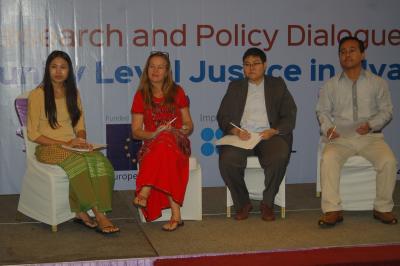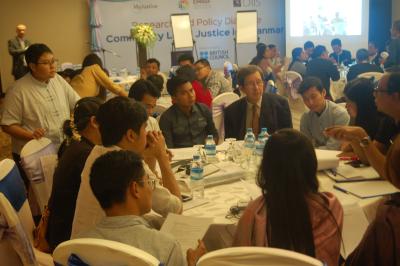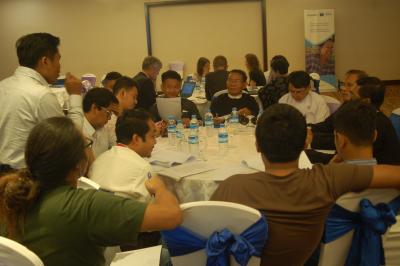Community Level Justice in Myanmar
How do ordinary people in Myanmar get their social disputes and crimes resolved and how do they perceive justice? Who are the main justice providers and how do they operate across different localities? What do these practices imply for access to justice for different groups of people, including women and minorities? These questions were discussed on 24 November in Yangon at a workshop on ‘Community level Justice’ that was organized by the DIIS-coordinated research project, EverJust, together with MyJustice, an EU funded program with the British Council that works to improve access to justice in Myanmar. The aim of the workshop was to initiate a research and policy dialogue among researchers and practitioners in order to discuss how recent research findings on access to justice can help inform policy and program interventions that better respond to people’s needs. A specific geographical focus was on Yangon and Mon and Karen States. Among the 60 participants were lawyers, civil society organizations, women’s groups, state level MPs, academics, international donors, and justice department members from the Mon and Karen ethnic armed organizations.

The workshop began with the sharing of research findings by the MyJustice and Everjust team members, followed by interactive working group discussions that focused on particular topics like gender, customary law, linkages between formal and informal justice systems, and the role of religion and ethnicity. MyJustice presented its research findings based on a very large survey with over 6000 respondents across Myanmar. Qualitative and quantitative data points to a clear preference among ordinary citizens for resolving disputes and crimes at the community level, by village and ward leaders, rather than seeking justice in the official court system. The findings reject the common perception that people seek justice at the community level because they lack knowledge of the law and formal justice. In fact, the majority of respondents have sufficient legal awareness. The challenge is rather that people mistrust the formal justice system due to corruption and inefficiency. Findings from the EverJust project, which is based on longer-term qualitative research, confirm this observation, and in addition highlight that religious and cultural beliefs strongly influence justice-seeking patterns. Overall, the EverJust research findings show that ordinary people prefer either to not make any complaints at all, as doing so is associated with shame and the loss of dignity, or to seek assistance from local authorities, religious leader and/or ethnic organizations. This sometimes involves forum shopping, whereby people draw on a multiplicity of authorities and personal connections to enhance their chance of getting a favorable outcome. This reflects both mistrust in formal justice institutions as well as a kind of formality-fobia, which means that people feel uncomfortable with the formalized procedures and languages of the official court system.

One core policy challenge highlighted by the research findings and the discussions at the workshop is that the ward and village tract administrators who resolve the majority of disputes and crimes in Myanmar have no clear legal mandate to do so. They are not part of the official justice system and therefore there are no clear and formalized linkages between these local justice providers and the higher-level courts and the police. Should the law be amended in order to include the ward and village administrators into the justice system and what repercussions could this have for local access to justice? One advantage of formalization is that it could help improve down-wards accountability as well as allow for more targeted capacity building of village and ward leaders, including in human rights and gender equality. However, too much formalization could also have the disadvantage of distancing ordinary citizens from the village and ward leaders, given that most citizens prefer less formal dispute resolution. Others suggested that the village and ward leaders should not alone resolve the disputes, but be assisted by committees that comprise different community members. This could enhance fairer dispute resolution and mitigate that local leaders abuse their powers and make decisions without wider consultation.
One working group also highlighted the need to focus on building trust in the formal system, rather than focus on legal awareness alone. The use of less formalistic language and procedures could help build trust. Others suggested that paralegals should work with the ward and village leaders, so as to create better links to the formal system.
Another issue discussed was the role of the justice systems of the Ethnic Armed Organizations (EAOs) in Mon and Karen state. The EAOs have quite extensive state-like justice institutions and written laws, and although most disputes in their areas of control are still resolved at the village level, they do constitute an important back-up that is seen as more legitimate by ethnic villagers than the official justice system is. However, the systems are not officially recognized. This finding is important to consider in the ongoing peace process and political dialogue on federalism in Myanmar. Should the EAO justice systems be recognized and how can they link up with the official court system in the future? In line with this question, there was a strong support for recognizing legal pluralism in Myanmar as such pluralism reflects the realities on the ground, including a large variety of different ethnic and customary laws. However, the argument was also made that such recognition should involve compliance with international law.

Finally, the topic of gender was discussed. It was highlighted that women, along with religious minorities, tend to have lower access to justice, including at the community level and in informal justice systems. They fear more to report their disputes and crimes than men do, and often this is exacerbated by the fact that very few justice providers are women. In addition, the types of crimes that tend to afflict women mostly, like rape and domestic violence, are often not treated as crimes at the local level. The working groups suggested the need for more women’s rights awareness training at the ward and village levels in order to enhance equal access to justice. Special women’s groups and reporting centers for women were also suggested in order to help women report sensitive matters.
The discussions at the workshop revealed high interest among the key stakeholders in the research findings, and the need to work more in the future on translating research findings into wider Rule of Law and Access to Justice programming in Myanmar.
Read more about the MyJustice project here: http://www.myjusticemyanmar.org/
DIIS Experts


